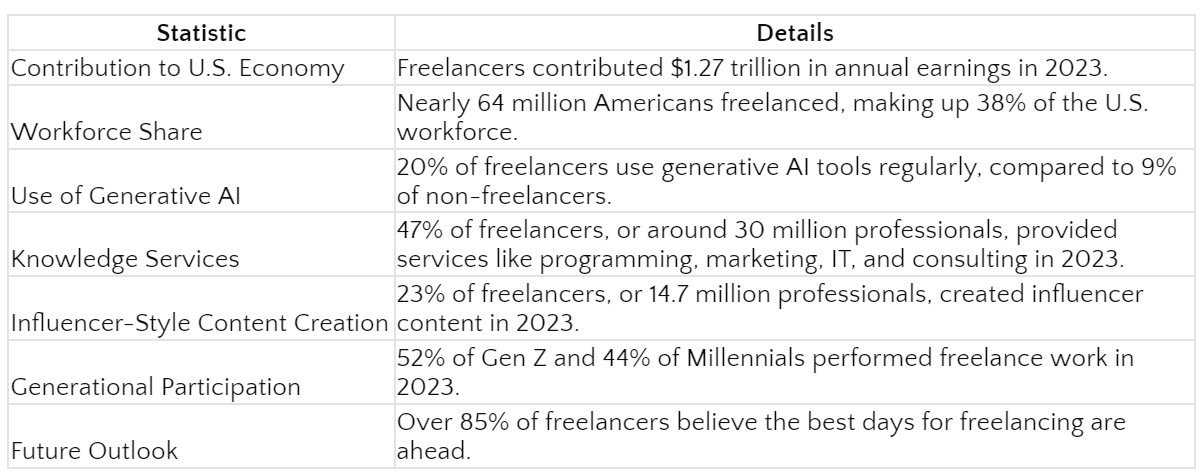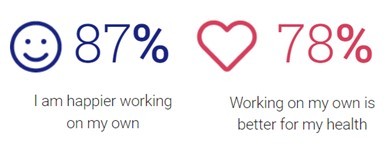Over the past several months I’ve noticed a consistent message throughout numerous articles and a few podcast listens: we’re on the precipice of the ‘Golden Age of the Gig Economy.’ This is a significant shift in our work culture and how we define what work means to us.
I’d like to address how this change is reshaping our approach to employment in profound ways, moving us towards more flexible, independent forms of earning a living. I’ll offer recommendations for both Employers and “Giggers.”
The Heart of the Gig Economy
There were over 400 books on Amazon when I searched “Gig Economy.”

It’s clear why this work model has dramatically risen in appeal, and the reasons are deeply intertwined with the core principles found in one of my favorite books:
“Drive: The Surprising Truth About What Motivates Us,” a book introduced to me by the Founder of our company a couple of years ago.
“Drive” sets out to prove that the strongest motivators for today’s workforce are not the traditional want of money and promotions for example, but rather the desire for autonomy, mastery, and purpose. It’s these motivators that are fueling the gig economy’s rapid rise.
We believe so much in these principles at our company, that we placed having Autonomy, Mastery and Purpose as our #2 company Core Value, only behind creating “Raving Fans,” another fantastic book worthy of a shout out. It’s a quick, fun and easy read by Ken Blanchard.
GIG ECONOMY STATISTICS
If you want to geek out on some gig stats, check out this Freelance Forward 2023 report on Upwork.
I’ve summarized the Key Findings in this table:

Another recent analysis shows the global gig economy market expecting to be USD 1.86 trillion in 2031, a Compound Annual Growth Rate (CAGR) of ~17%. This is not insignificant, as it reflects economic, social, and technological trends that are transforming the way we work and contribute to the global economy.

And a final report that I found to be compelling from MBO Partners.

DRIVEN BY DEEPER MOTIVATIONS: AUTONOMY, MASTERY & PURPOSE
AUTONOMY
The gig economy offers an unprecedented level of Autonomy. Workers can choose not just when and where they work, but also whom they work for. This flexibility is a stark contrast to the rigid schedules and hierarchical structures of traditional employment, resonating with many of us and our desire for self-direction.
The shift from traditional 9-to-5 jobs to more flexible, freelance, and contract work aligns perfectly with Pink’s assertion that people are more motivated when they have more control over their work life.
- Recently, on Mike Rasmussen’s Vlogcast, #WheresYourNext, a platform where he often talks about the relevance of gig work, I shared a story that aligns with the essence of “Drive,” and our unique reasons for wanting more autonomy in our work life.
- I had just interviewed a single father of two young boys who is in the midst of transitioning from military to civilian life. His foremost priority? To secure consulting gigs that afford him the flexibility to work unconventional hours. He has a heartfelt mission to spend typical working hours with his boys, one of whom is autistic. He wants the freedom to tailor his work life around what matters to him most: time with his boys and flexible time to support Autism causes that he’s involved with.
MASTERY
Secondly, there’s Mastery. The gig economy is well-suited for skill development and self-improvement. Freelancers and gig workers continuously hone their crafts, taking on projects that challenge them and allow for growth.
This pursuit of excellence and continuous improvement is a core component of Pink’s Mastery drive. The gig economy encourages workers to take on challenging projects that stretch their abilities and contribute to their professional growth.
- In my role as a Technical Recruiter, I’m fortunate enough to interact with some brilliant minds in the field. What sets these top performers apart is their constant pursuit of knowledge. Often, they highlight how crucial flexibility is, particularly for events like coding bootcamps that teach new languages, hackathons and coding meetups, and even leading their own workshops and talks in academic settings. For them, these endeavors go beyond side projects, they’re essential for their continuous growth in the tech world.
PURPOSE
Lastly, Purpose. Gig workers often find meaning in aligning their work with their personal values and interests. The gig economy allows individuals to engage in work that feels significant and fulfilling.
This jives with Pink’s idea that motivation is fueled by doing work that matters. In the gig economy, workers can select opportunities that not only pay the bills but also fulfill a deeper sense of purpose by contributing to something larger than themselves.
- This month a best friend of mine, who was a highly awarded Super Star in the Talent Acquisition space for a Fortune 500 company, decided to take a leap of faith. After years of climbing the corporate ladder and proving herself as a force in her field, she chose to step away from the stability and financial security her role offered.
- This wasn’t a decision made lightly, it was a bold move towards realigning her career with work that speaks to her heart and feeds her soul.
- She’s now navigating the waters of the gig economy, seeking out opportunities that not only tap into her vast expertise, but also promise a greater sense of fulfillment and purpose.
- It’s a testament to the power of listening to that inner voice calling for a change, a shift towards a career path defined not just by success, but by purpose and joy.
PROCEED WITH CARE
As empowering as this may all sound, and it certainly can be, please do your research and consider these implications before quitting your corporate gig and diving in headfirst.
- Acknowledge the potential instability and unpredictability.
- Ensure you have a financial buffer or savings to manage periods of inconsistent income.
- Plan for your health insurance and retirement savings, as these are typically not provided in gig jobs.
- Research the market demand for your skills and how you can differentiate yourself from competitors.
- Understand your tax obligations as an independent contractor and set aside money for taxes accordingly.
- Be prepared to manage your own schedule and juggle multiple projects or gigs simultaneously.
- Develop a strategy for marketing your services and building a strong professional network.
- Understand the basics of contracts to negotiate terms and protect your rights as a freelancer.
- Be open to learning and adapting to new skills or technologies relevant to your field.
- Prepare for the highs and lows of gig work, including handling rejection and periods of low work volume.
In a Part II follow up to this article, I’ll do a deeper dive into these implications and offer suggestions on how to navigate each with practical strategies and real-world advice from gig workers on our consulting teams. I’ll also address common criticisms and counter arguments to gig work.
RECOMMENDATIONS
FOR ‘GIGGERS’
Embrace the learning mindset. The gig economy thrives on adaptability and continuous skill development. Stay curious and be proactive in seeking opportunities to grow and evolve professionally. There are numerous inexpensive, and sometimes free, online course offerings in just about any subject you can imagine.
I’m a big fan of Udemy and Coursera online trainings, especially for staying abreast of AI advancements.
LinkedIn has a plethora of free training within their Learning Center. From your home page, you’ll see this at the top of your page:

edX: offers access to courses from top universities around the globe, covering everything from computer science to philosophy.
Khan Academy: while typically associated with school subjects, provides deep dives into various professional skills and concepts, all for free.
Additionally, don’t overlook the power of community learning: local Meetups, workshops, and conference can provide phenomenal networking opportunities that will greatly enhance your professional journey.
FOR EMPLOYERS
Rethink engagement and retention strategies. Consider how your organization can offer gig-like flexibility, autonomy, and a sense of purpose within traditional employment structures to attract and retain top talent.
Here are some ideas to consider. I’m not saying throw all this at your leadership at once. Have a thoughtful plan. Implement what works with your Core Values and Culture.
Flexibility in Work Arrangements: Introduce flexible working hours and remote work options that allow employees to choose how, when, and where they work best. This could include compressed workweeks, flex-time, and the opportunity to work from anywhere.
- Last summer, my Recruiters and I spent a week working together from a mountain home in Colorado. A change of scenery for a whole team does wonders to reignite team synergy!
Project-Based Assignments: Adopt a project-based approach for certain roles or tasks, allowing employees to choose projects that align with their interests and expertise, similar to how gig workers select gigs. This can foster a sense of ownership and engagement in their work.
- My company is all-in on this one, and we’ve put tremendous effort into creating an elite team of technical experts who are solely interested in gig work.
Purpose-Driven Projects: Encourage employees to participate in projects that have a clear social impact or align with their personal values, providing them with a sense of purpose beyond their day-to-day tasks.
- I’m thankful that my company affords me the time for volunteering on committees with charitable causes close to my heart, even though this sometimes requires a heavy lift during normal working hours.
Autonomy in Role Development: Empower employees to shape their roles and career paths within the organization, including opportunities for cross-functional projects and lateral moves to explore new areas of interest.
- When I first started at my company with a team of three within staffing, we hired each on potential and decided to figure out where their skills best fit within our organization as the months went by. One became our dedicated HR Manager and became SHRM certified (bravo!), one moved to our Managed Services division as an Account Manager, and one stayed with me within recruiting for our staffing division, where we both tried our hand at the sales side for a few months. We ended up hiring a proper salesperson and stuck to recruiting & sourcing. 😊 I love that we each had the autonomy to explore and carve out our own niches within the company.
- This approach not only allowed us to uncover and develop our strengths but also fostered a culture of growth and adaptability.
- Our journeys reflected our company’s belief in the power of investing in people and their potential, highlighting the value of autonomy in driving personal and company success.
- It’s a testament to the idea that when given the freedom to navigate our own paths, we can discover where we truly shine and contribute most effectively.
Transparent Communication: Foster an environment of open and transparent communication about company goals, challenges, and successes. This can help employees understand how their work contributes to the larger mission, enhancing their sense of purpose.
- One good way to do this could be with Quarterly Business Reviews (QBRs.) A fun way to do this is to follow your QBRs with a company outing. We’ve done events such as Top Golf, axe throwing and fancy dinners.
Personal Development Plans: Work with employees to create personalized development plans that include skill acquisition, certifications, and training opportunities. Encourage attendance at conferences, workshops, and industry events to further their professional growth.
- Our company is currently underway with an initiative where each leadership member is mapping out their annual events and training plans. This will enable us to accurately evaluate and allocate budgetary resources across different divisions.
Recognition and Reward Systems: Develop a recognition program that celebrates both team and individual achievements, especially those that align with the company’s values and contribute to its mission. Consider incorporating peer-to-peer recognition to foster a supportive culture.
- Perhaps utilize an internal platform where employees give shout-outs and kudos to their peers for their daily contributions, big or small. This continuous stream of recognition ensures that positive feedback becomes a part of the company’s daily culture, not just a rare occasion or annual event.
Community and Well-being Initiatives: Create initiatives that support employee well-being and foster a sense of community, such as volunteer days, wellness programs, and team-building activities. This can help employees feel more connected to their coworkers and the company.
- We give all internal employees $400 towards a Garmin watch of their choice. We love workout challenge competitions! We’ve also talked about having hiking meetings on one of our local trails and paying for gym memberships.
Innovative Benefit Packages: Offer benefits that resonate with the modern workforce’s needs, such as mental health support, financial planning services, legal services and family-friendly policies. Within larger companies, many of these benefits are offered within your Employee Assistance Program (EAP.)
- Even for small companies, you could possibly offer the above services by building a network of local businesses and service providers willing to offer discounts or special offers to your employees, maybe even on a barter system. Becoming involved with your local Chamber of Commerce would be a great start.
- I even love the idea of the good old-fashioned lunch-n-learn. Have employees share knowledge and skills with peer-to-peer learning sessions. You might just find talents within your groups that you never knew you had.
By integrating these gig economy-inspired ideas into traditional employment structures, companies can create a more fulfilling and attractive workplace for current and prospective employees.
A FLUID FUTURE AHEAD
It’s no wonder that the gig economy is flourishing. As “Drive” shows, when work aligns with our deeper psychological needs it ceases to be just work. It becomes a means for satisfaction, growth, and fulfillment.
This evolving landscape of gig work is tapping into something fundamental within us all.
It’s a reminder that perhaps we’re not just witnessing a shift in employment patterns, but a transformation in what it means to work and live with purpose.
